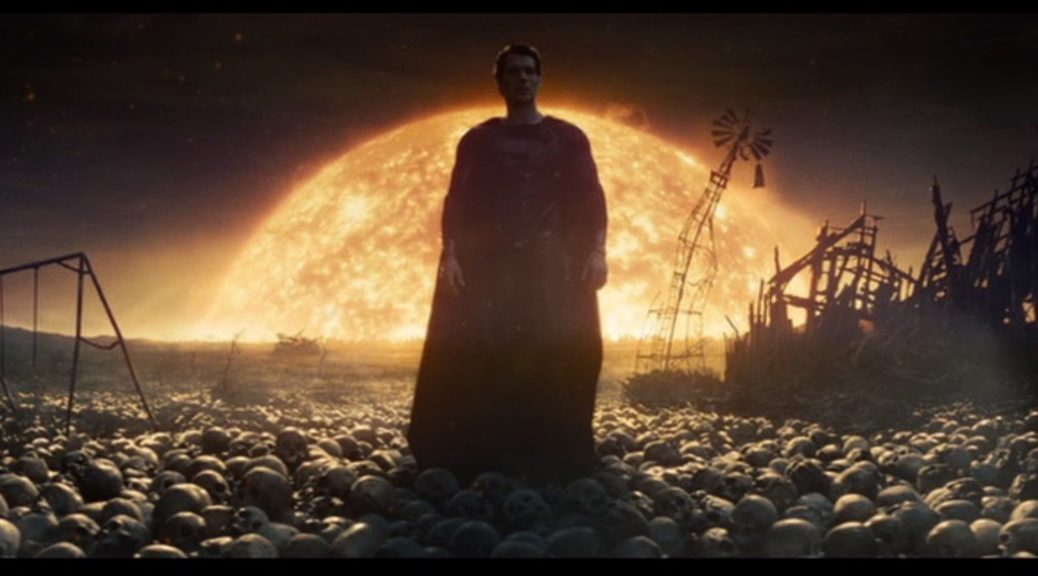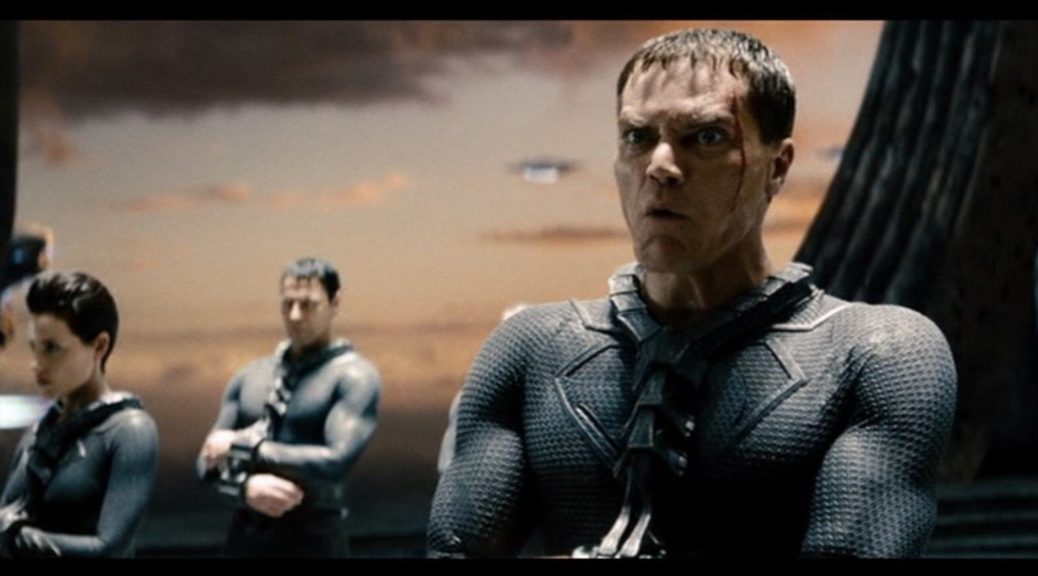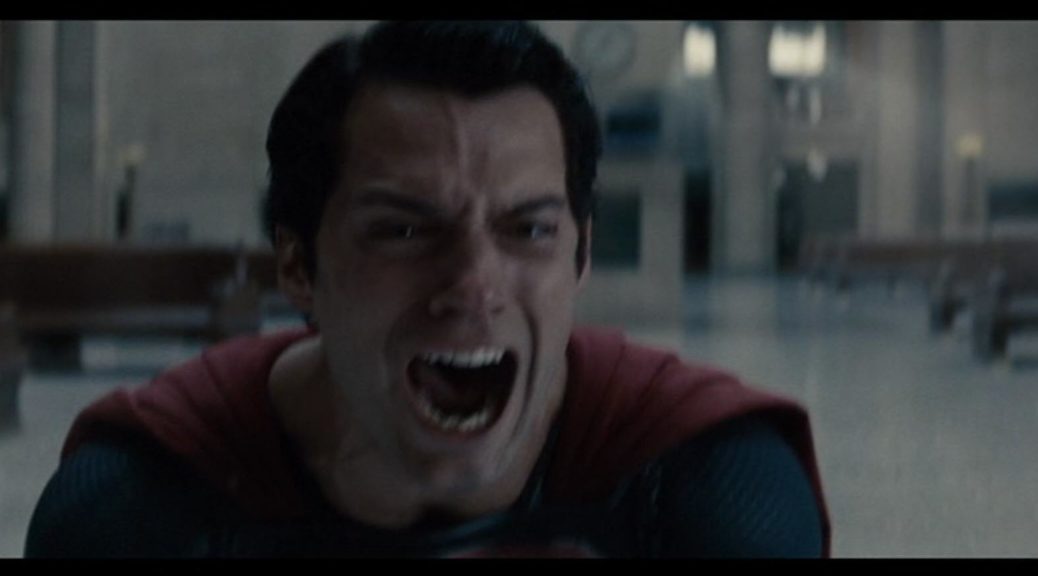Man of Steel (2013) - Review
Originally published July 2016I'll be honest and say that I didn't care for Man of Steel much, having only seen it recently for the first time. I already had my expectations lowered by friends who had seen it and by the reviews I read about it. I was prepared for the worst. It, more or less, met those expectations, so I wasn't pleasantly surprised, but I wasn't disappointed either. It was just a big "meh".
Then I watched the old Christopher Reeve Superman movies again. Suddenly, Man of Steel ain't so bad. It's still not great, by any means, and I still think it's a mess of a film, but I'm willing to give this movie a fair shake after the boring blandness of the so-called "good" Superman movies.
Image: Warner Bros. | Standing atop the bones of previous films
Pros
More interaction between Clark and his human parents
His space dad feels more involved than Brando did
The most stuff is happening of any Superman movie
Themes they were trying to use would have fit the character, had they achieved their goal
Henry Cavell is a suitable Superman
Hanz Zimmer's score
Cons
A long movie with a lot of brooding
Poor and confusing editing; jumping around in time needlessly
Despite all the stuff happening, it's tough to follow or watch because it's all happening quickly and shot poorly
Not much "fun" to watch, because it has to be serious
Unable to achieve or earn the various emotional scenes or thematic messages it was seeking
Goes on too long and removes all the tension/involvement in many scenes; it ends up with clichés or overly sentimental bullshit
Looks like Superman, but does not act like Superman
A lot of questions raised without any answers
Plot & Thoughts
Much like the first two Superman movies of the ‘70s, Man of Steel tells the story of the small alien baby from Krypton who makes his way to Earth, is raised by a pair of down-home Americans with good American values, and grows up to become the greatest superhero. An old villain from his home planet, General Zod, is exiled from Krypton before it blows up—because that's a good way of getting rid of someone—who eventually discovers Earth and faces off against Superman due to their conflict of ideals.
Image: Warner Bros. | OOOOOOOooooooooooo
There's a lot more depth to the story than before, with Zod having actual motivations beyond simply being evil. There's a reason he shows up on Earth in the first place and there's a reason he has to fight Superman. Not all of these reasons make the most sense, and they fail at managing to make him the least bit the sympathetic sociopath they seemed to be striving for, but there is still a lot more going on with the plot and characters than there ever was before. However, while the old film told its events chronologically, Man of Steel prefers to cut a bunch of these scenes up and display them in a different order, injecting the past into the present when it feels it's appropriate to get the message across. This is often jarring and confusing, not to mention annoying, because doing this does not actually help the story much. The only advantage to this is that we're able to get to the action between him and Zod faster without all that origin story getting directly in the way, just occasionally in the way.
In all honesty, Man of Steel had the potential to be a good Superman origin-story movie. I know people are getting a little tired of the gritty, brooding, melancholic hero movie that Batman made so popular, but I don't think it's out of place when telling the story of a boy who goes years without realizing he's an alien, has to adapt to his freakish powers, and then chooses to do the right thing with these powers. In fact, the best parts of the movie are when he's interacting with his human parents and coming to grips with who he is. I like the fact that the filmmakers spent the time to show how, as a kid, he would likely freak out about being able to see through walls or have super-sonic hearing in comparison to everyone else. It would make sense for him to be an outcast for his weirdness, not by his choice, which was always a decision I never completely agreed with in the Reeve movies.
Image: Warner Bros. | Don't mope, son. At least you're not Batman.
The main problem that Man of Steel faces is that for every deep, intelligent theme it attempts to discuss, it either goes too far with it or in the wrong direction. Essentially, I felt that none of the main messages it was trying to say were ever achieved. For example, the main thing his human dad (Kevin Costner) tried to teach him was to be humble and discreet with his gifts. Every scene with him is about how Clark is special, in a unique position, and that he needs to make smart decisions about not exposing his abilities to everyone because that's just going to raise questions and cause trouble unless the world is ready for a Superman. The scene with the random tornado—that came straight out of the lazy-writing book of cliches—manages to say this without using words. It's a shame that it relies on a cheap plot device to do so, but the scene still gets the message across in a successful manner. Unfortunately, the way that Superman fights his villains and continues to destroy his surroundings or let them be destroyed in the process indicates to me that he learned nothing from his dad. If he had actually learned the lesson of discretion, the city of Metropolis and the IHOPs in his local area wouldn't have been so utterly destroyed by the end.
Image: Warner Bros.
There are a lot of these sorts of instances where the movie is trying to say one thing about Superman's character and how his upbringing has shaped him, and then it goes and shows us that isn't the case. Themes aren't the most important thing when it comes to a movie, but when you're trying to make your movie deep and emotionally driven about a character who normally has less complexity in his story than a first-grade math problem, themes tend to hold a bit more weight with the audience. None of the big themes or messages are ever earned. This is especially true of the ending. I don't typically feel the need to give spoilers, but I want to get my point across.
Man of Steel SPOILERS
Superman kills Zod. This three-word sentence is already blasphemous to Superman fans, because Superman's problem, much of the time, is that he doesn't kill and has to keep dealing with particular villains over and over as a result. In the event that he does kill someone, it's a big deal and usually results in a much deeper conversation about his character. Naturally, Superman fans and audiences like me were not pleased with this decision.
However, I'm not a Superman fan. I couldn't care less about Superman or Batman killing someone, so long as it served the purpose of the story. I even knew about this ending going into the movie, and was not bothered by the details before I saw it. I was only upset about it after I saw it happen in the movie. If you ignore the fact that he's a comic book character with a deep history of not killing people, if you ignore everything that is supposed to be a thing about him and just analyze his character based on what the movie presents, it still fails terribly.
Image: Warner Bros.
He kills Zod and starts weeping immediately, with some sad silence behind him, like it's supposed to be emotional for us as well. Yet, at no point in the movie did I feel like this was a logical moment we would reach. There are no scenes leading up to this that talk about him having to do something drastic, or how all life was precious, or just anything that would justify his emotional reaction over killing the guy who was going to destroy the world and kill everyone in it. What's worse is Superman's disregard for life in the scenes leading up to this moment. The city he's "protecting" is utterly destroyed because he doesn't know how to take the fight to less populated areas. His fistfight probably killed thousands, if not millions, of people. He even blows up a Krypton scout ship, which apparently had millions of unborn Kryptonian fetuses on board, which I guess says a lot about Superman's thoughts on abortion. When Zod says not to do it because he'll essentially wipe out a race of Kryptonians, Superman replies, "Krypton had its chance." Clearly, in the 10 minutes prior to killing Zod, Superman has very little remorse over the death he is dishing out, yet we're supposed to feel as sad as he does for killing the villain.
Image: Warner Bros.
Moments of unjustified emotion like that are scattered all throughout the film, including the "romance" between him and Lois Lane that's barely there. Half of what the people say in this film makes you groan or laugh at how stupid it is, because it doesn't ever feel like the statement is earned. In a moment toward the end, a woman is looking out at the dead landscape of a demolished Metropolis, where ash covers the ground, shrapnel juts from the dirt like steel tombstones, and the sky is grey with smoke and debris as the sun struggles to light up the barren crater left by Superman and his saving-the-planet technique. This woman, with the utter catastrophe of his benevolence in front of her, says, "He saved us." What else can you do but laugh at the absurdity?
Image: Warner Bros. | This is saved?!
TL;DR (Conclusion)
Man of Steel isn't a good movie; in fact, it's a failure in many ways. However, it had a lot more ambition than the other Superman movies. It failed in achieving its ambition, but it at least gave viewers a lot more to look at and work with. If I were forced to choose between this and the Superman films of old, I would choose this (and Superman IV). Christopher Reeve was the best film representation of Superman as a character and will likely continue to be, but his movies were boring as hell and had no direction or idea where they were going. You'd have been better off looking at a Christopher Reeve poster for 2 hours than watching those movies. At least Man of Steel had some idea what it wanted to do, even if it failed miserably at achieving it.






